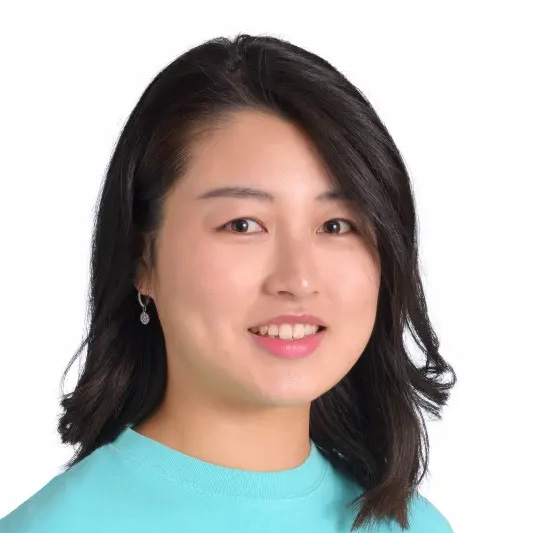IB PYP UOI Class Introduction (5-year-old) Vol.2 - Preschool at CGK International School
Last time, the Sky class (5-year-old class) completed the International Baccalaureate (IB) unit of enquiry (UOI), 'Where We are in Place and Time'. Through a variety of activities, the children got to know 'What kind of community do I belong to', 'Each of us has a role to play' and 'By taking responsibility for our roles, we are helping someone else'. With these experiences as a foundation, the children will further deepen their learning in the next unit of enquiry (UOI).
The next unit of inquiry (UOI) that the Sky class will tackle after developing teamwork is;
"How the World Works".
The central idea, or the theme, we want the children to experience throughout this unit, is,
"We use the scientific process to understand our world".
Many people might feel that this Central Idea is difficult. But the teachers of the Sky class are not just using this unit to try and teach children the joy of experimentation or how the world works. When starting a Unit of Inquiry (UOI) or a Central Idea, the teachers are planning for the future, thinking: 'What skills do we want the children to have acquired by the end of this unit?’ This kind of planning is very different from the teachers simply deciding all the activities from the start and having the children follow along. Rather, they work flexibly with the children every day to create the content of the Unit of Inquiry (UOI) together, by observing the children's reactions and what they are interested in. This is what the International Baccalaureate IB curriculum is all about.
Background to the choice of this theme (What skills do we want children to acquire?)
- We want children to: Pursue questions thoroughly, not to be satisfied without a full answer.
- To learn that there are different ways to solve problems.
- To broaden their knowledge by using the interview skills they acquired in the previous unit of inquiry (UOI) and by interacting with a variety of people.
- When new questions arise in the process of solving a question, for the children to learn that there are many things in the world they don't yet know.
- To realize how much fun it is to solve problems on your own.
The following four months are spent following the Central Idea of "We use the scientific process to understand our world". The following are some of the activities and skills that the children have acquired over the four months of the project in both English and Japanese, in line with the Central Idea of "We use the scientific process to understand our world".
Edison was a Professor of Light Bulb!
This happened one day in the Sky class. I saw the children using a lot of origami and drawing paper during their free time. It would be fine if they were using origami and drawing paper some clear purpose, but if they were just drawing, I thought I would encourage them to use the drawing notebooks that they all have. Then, in the Japanese class time afterwards, we all thought about the concept of 'SDGs' and 'what we can do'. One of the questions the children asked was: 'Is it only paper, or also electricity? Is it an SDG when the teachers always turn off the lights when we go to the park?". From that point, everyone in the Sky class became interested in electricity.
"How long do you think it would take for the lights to go out if they were left on all the time?"
"Maybe a week? Or maybe a year? But I've never seen anyone change the lights."
"I'm sure the teacher changes them on her day off."
"I wonder how the electricity works in the first place."
"I wonder who built it first."
As I watched the children engage in these funny conversations, I saw what was originally about SDGs, naturally turn to questions such as 'How does electricity work?' and 'Who invented electricity?'.
So as we looked into it together, we came across the name of the famous man Edison. The children were very interested in the name Edison! I've heard that name before!' The children were curious: "We have electricity now because Edison made the light bulb" and "But how did Edison make the light bulb before anybody knew anything about it?"
Then they read Edison's biography and learnt that Edison had actually made hundreds or thousands of failed light bulbs before finally perfecting it. At that point, the children asked, "Was Edison trying to tell us that it's important not to give up when you make mistakes?" and "Is it good to experiment a lot and also to fail a lot?" “Edison knew a lot about light bulbs, so he is a light bulb “Hakase” (Professor or expert)! They eagerly shared their thoughts with each other. There in the Sky class, the Japanese term "Hakase” (Professor or expert) was introduced and then everyone wanted to use it.
"I know a lot about Pokémon, so I'm a Pokémon hakase!"
"I love insects, so I'm an insect hakase!"
"I love books, but I can also sing many songs, so what kind of hakase should I be...?"
The children naturally started to talk more about the unit of inquiry (UOI), starting from the idea that 'unnecessary use of paper is wasteful'.
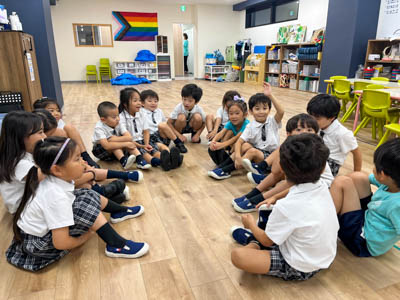
How does a Professor find out what he doesn't know?
The students in the Sky class recently learned that Edison made countless mistakes before inventing the light bulb. The children were very interested in this and wanted to be “hakase” (professor) of something too!' So, under the theme of 'How do Hakase investigate what they don't know?', we held a fun activity to learn the skills needed to conduct experiments and investigate matters.
■Length
The children connected small blocks that they were familiar with in everyday play and measured the length of their chosen toy in the classroom by "how many pieces". The children experienced length measurement in a playful way, saying things like, "It's longer/shorter than I thought it would be."
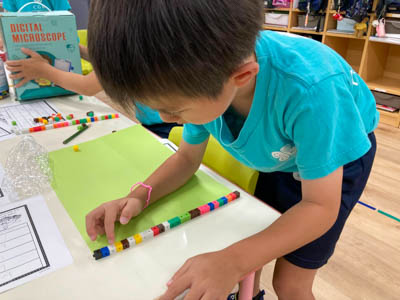
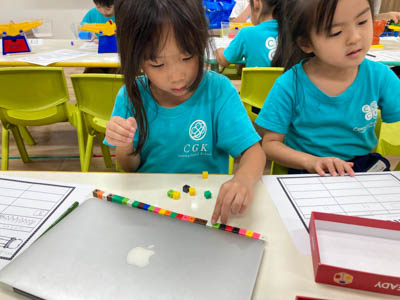
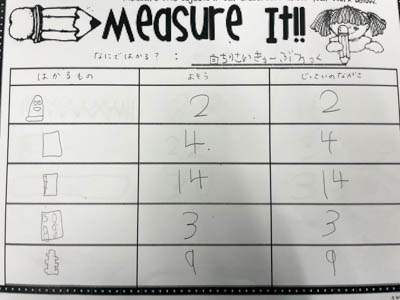
■Weights
Using a balance, children compared the weights of two toys and recorded them in a drawing. The children who finished the game quickly also found out what was the heaviest and lightest of the items they compared. In another game using the balance, children enjoyed an activity where they used 5g and 20g weights to find toys of the same weight.
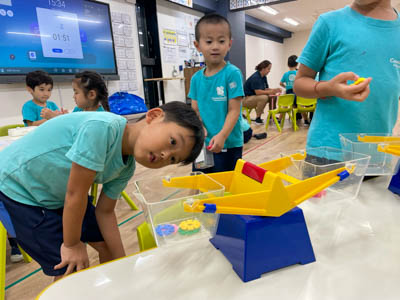
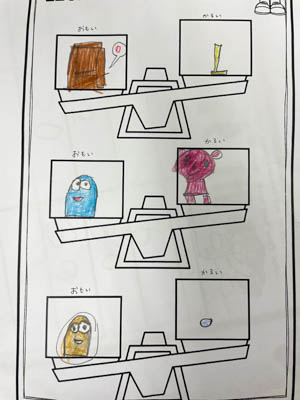
■Five senses
In order to be aware of the five senses that we are always using without thinking about it, we discussed why the senses 'sight/hearing/touch/taste/smell' are necessary for Hakase when conducting experiments. In the course of the discussion, the children focused on parts of the body that they do not usually move consciously, such as expanding their nostrils or moving their ears. The children were particularly interested in 'taste', asking questions such as "Do you feel sweet or sour from different foods? Or is it something you feel in your mouth?" one child asked. It was a very good question and we all decided to find out.
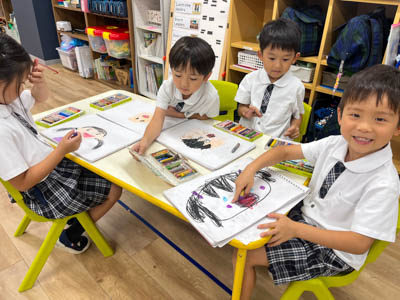
■Fruit tasting experiment
The children's interest led to a shopping trip to the supermarket for a tasting experiment. Having purchased the fruits and vegetables they wanted to experiment with, the students of the Sky class tried them all, being aware of where they sensed taste in different areas of their mouths. One child said, "Oh! When I put the food on the tongue, the taste gets stronger... do you feel that...?" One of her friends noticed it too. It was a moment when the children's own inquisitive minds led to new discoveries about the role of the tongue.


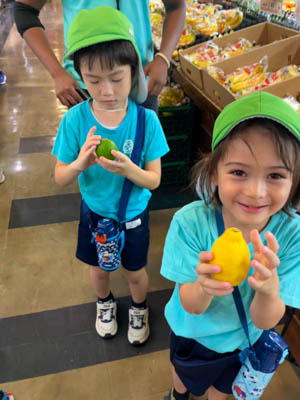
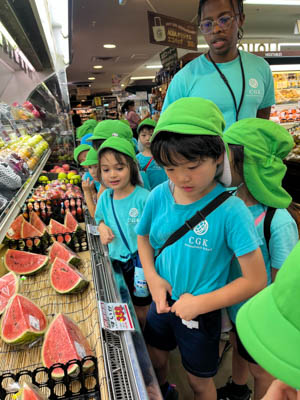
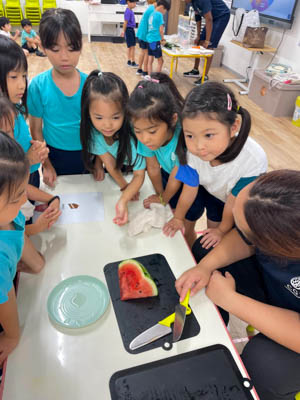
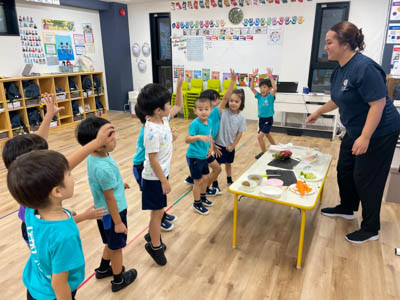
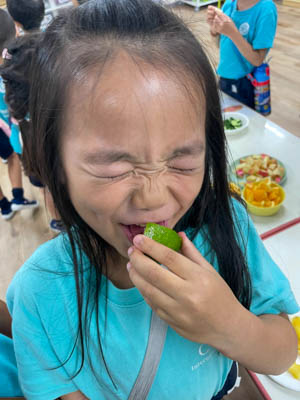
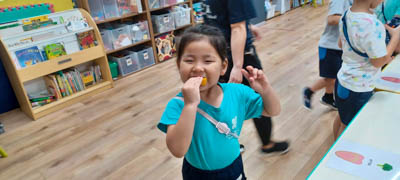
■Making experimental predictions
One day I asked all the students in the Sky class a question.
"What do you think would happen if you put alcohol sanitizing solution in a plastic bottle with a little water in it?"
When I asked this question, the imaginative children came up with a variety of ideas.
"Maybe the water will turn into soda water?"
"Maybe clouds will form..."
"Maybe the water will change colour?"

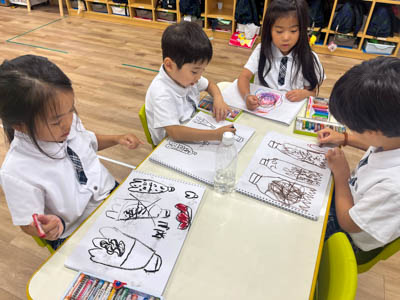
After each child had drawn a picture of their experimental prediction, they had to answer the question.
The result was... the water was a little bubbly and clouds formed inside. Some students were happy that their predictions were right on target, while others were disappointed that they were wrong.
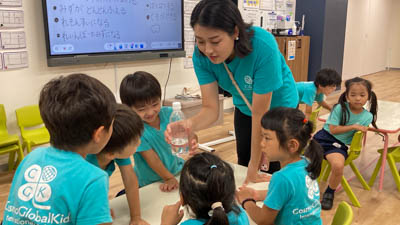
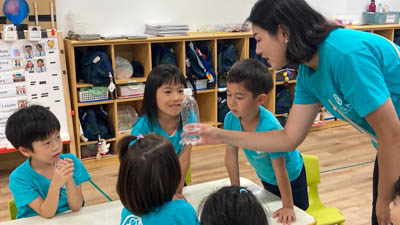
However, I said to them that its not important whether the results of the experiment are correct or incorrect, but what is important is to "let your imagination grow and come up with many different ideas without being afraid of failure"..
The children then said, "Oh! It's just like Edison! Edison made a lot of mistakes before the light bulb was created, which is why now we have developed it the point where we can use electricity freely!" The children seemed to be interpreting the concept of 'the process is more important than the result' in their own way, as it was connected to this story from history that they had learned before.
In addition to the plastic bottle experiment, the children also enjoyed various other experiments, such as 'How many drops of water can be stored on a 10 yen coin', 'Does the toy I chose float in water or not? In the process, the Sky class experienced the difficulty of making predictions, but at the same time the excitement of learning about the unknown.
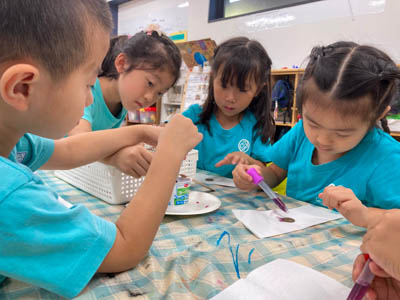
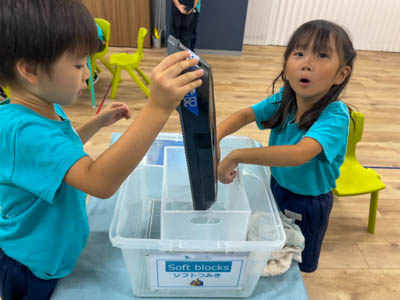
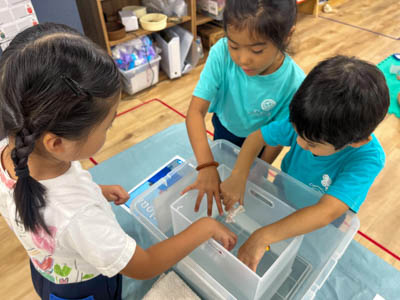
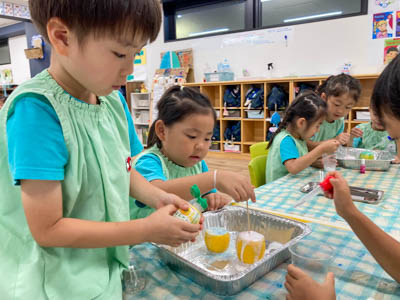
What kind of Professor would you be?
The students of the Sky class have been preparing to become "Hakase” (Professors or experts). Now it's their turn to experiment and investigate the questions they had!
However, the teachers of the Sky class wondered how to ensure that each child would be able to do research in line with their own interests? The idea of lumping all the children into a single topic and saying to them, "Now, let's solve this question!" did not seem like an appropriate approach as educators. It would crush the individual child's curiosity and inquisitiveness.
As was mentioned previously, the purpose of this Unit of Inquiry (UOI) is not to teach the students the joys of experimentation and science. Rather, experimenting and investigating are tools to answer questions. When a question comes up for the children, we want them to develop 'problem-solving skills', to try to understand things on their own, rather than just sitting and waiting for an answer or letting the question remain unanswered. For this reason, we needed to get the children to think of interesting questions themselves, rather than having the teacher set the theme.
So, first of all, in order to find out what area each student was interested in, we gave the children picture cards and asked them to sort out whether the pictures on the cards were 'living things' or 'non-living things'.
Although this was an activity for each group, here the children did not make the decision on their own, but rather they asked their teammates, "Is this a creature or is this not a creature? Is this a living thing or not?” The children were seen participating enthusiastically in the activity while talking with their teammates, "This is a living thing, isn't it?
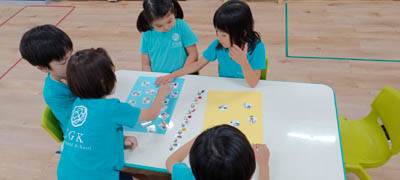
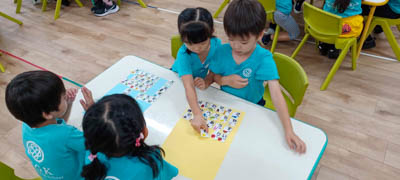
The next step was for each team to discuss what common characteristics the creatures had and why they came to their decision.
<Living things...>
- Eat to live
- Make sounds from their mouths
- Have a place to live
- Have a brain
- Give birth to children
- Have feet
These were only some of the opinions expressed by the children, and we heard many more that spilled out. One of the most interesting questions was "Are eggs and trees living things?"
"Trees are living things because they grow and want water and sun!"
"Yes, but trees don't walk and they don't have brains."
"But snakes don't have legs, but they are living things, aren't they?"
The Sky class enjoyed this discussion, which was like a riddle with an answer that was both obvious and difficult to figure out. Each team had a different way of thinking, but when I saw how some of the children were able to express their own opinions, while at the same time acknowledging the values of their friends without rejecting their opinions outright, I felt that it was a very nice, international atmosphere.
And from this day of thinking about 'living things' or 'non-living things'', the students of the Sky class started to ask me a lot of questions. Looking back, it seems that the children had had doubts about these things in the past, but there hadn’t been any chance for them to communicate or discuss it with anyone. From that time onwards, whenever the students had a question about something, they would say, "Teacher, I just thought of a 'why story'!" and they began to tell me what they thought about every day.
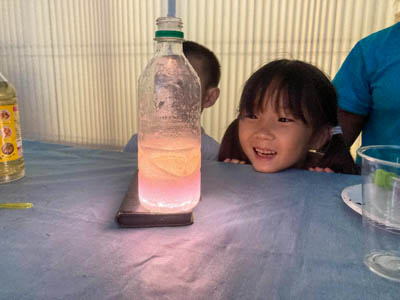
Sky class’s tree of knowledge
"Why do cat-sharks feel like sand to the touch?"
"Why are horses so heavy but so fast when they run?"
"Why do rainbows form when there is sun and rain?"
"Why did people used to wear kimonos but now they wear clothes?"
"Why is the steering wheel of a car in Japan different from that in America?"
Through their own observations and experiences, the Sky class students were full of many 'why stories'. We were able to learn about each child’s interests and questions, but there are so many things that even adults don't understand unless they research them properly.
As an aside, "You're a teacher, why don't you know the answer?" I was once sincerely asked by children. At that time, I said, "The teacher knows a lot about the Sky class students. That's why she's Sky “Hakase”. But there are a lot of things about everyone's 'why stories' that even the teacher doesn't understand. So now, can you all be "hakase” and tell us what you've found out?" When I said this to them, they said "Oh, I see..." they easily understood.
A wonderful idea was born out of this casual conversation with the children. One of the Sky class boys asked, "Why are there four seasons in Japan?" From there, the Sky class started to focus on the shapes of the trees and the colours of the leaves when they went outside to play.
"It's summer this time of year, so the trees have green, healthy leaves on them."
"Some trees have flowers on them as well as leaves."
"Do you think the green leaves will grow into flowers?"
"This is another new 'why story'!"
These children's conversations gave me a new idea. I decided to tell the children about it after we returned to the classroom.
"We talked about trees, leaves and flowers in the park today, didn't we? I thought of an idea, how about we all make a big tree in the Sky class room? Everyone should write the 'why story' they came up with on a leaf and stick it on the tree. If everyone solves their 'why' story and becomes an expert (hakase), we'll put a flower on it. What do you think?"
Of course, I had no intention of telling them about this idea and forcing it through if the children's response was not very encouraging. However, the children were unexpectedly very supportive. They said, "That's good! I want to be hakase and have a flower in bloom!" The students immediately started drawing a large tree trunk. The Sky class students named the tree "Sky-san's Hakase Tree"
At first, "Sky-san's Hakase Tree" consisted only of a large tree trunk and branches. In no time at all, the lonely tree was covered with 'why leaves'.
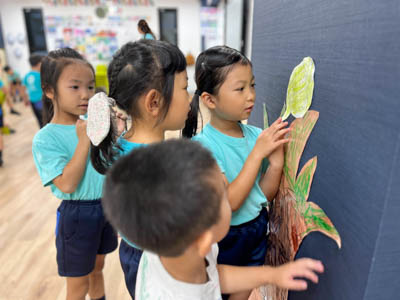
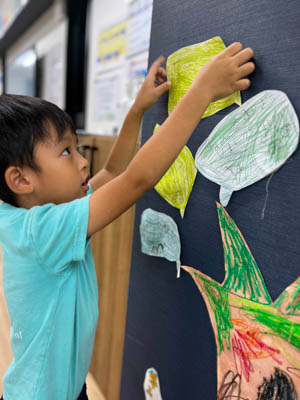
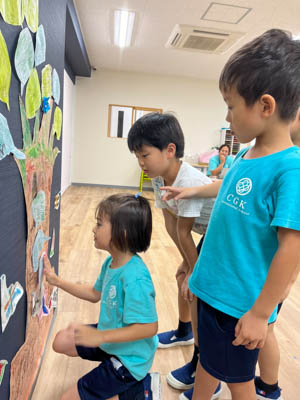
However, a new obstacle came up at this point. While the leaves were increasing in number, the flowers were not blooming on the 'Hakase tree'.
So we asked the children, "How do you think the 'Hakase tree' can get more flowers?" They replied,
"I'll look in the Neo-illustrated book or on YouTube!"
"Ask an adult."
"I'll look at the news."
The children were not quite sure what to think.
One girl said, My 'why' question is about dolphins, so if I go to an aquarium and learn about dolphins, I might be able to become a hakase.
Then everyone's face lit up. 'My 'why' is about animals, so I want to go to the zoo!' 'Where would I go to find out the solution to my 'why'?'
In this way, the Sky class student's curiosity and inquisitiveness led them to decide to go on an 'extracurricular research' project called an excursion.
Time to go for extracurricular research!
The Sky class decided to undertake extra-curricular research projects at a science museum, an aquarium and a zoo in order to answer the children's interests, and the Sky class seemed to understand better than anyone that they were not just going on a field trip for fun, but as part of their research.
At the science museum (Toshiba Science Museum), where we first went, they watched petals flutter and shatter during a liquid nitrogen show, and experienced how static electricity made their hair stand on end, and came up with new questions.
The three groups took action separately here, and the teacher did not guide them. The children systematically made their way around each area, using the teamwork they had developed in the previous unit of enquiry (UOI), 'Where We Are in Place and Time'.
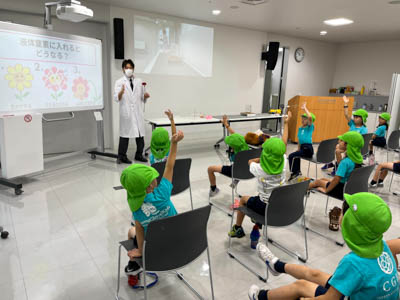
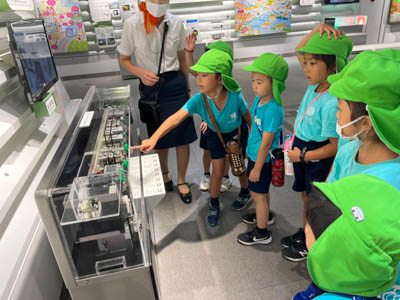
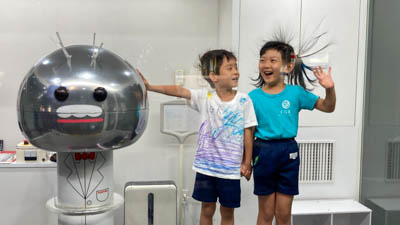
The next stop was the aquarium (Yokohama Hakkeijima Sea Paradise). Seeing the sea creatures up close, which was the theme of their 'Why', the children asked questions such as: 'They are bigger than I thought! Which one of you is bigger than me?" they naturally began ‘comparing features’. Some of them even asked questions to the zookeeper in order to become hakase!
It must have taken a lot of courage, but when the visit to the aquarium was over, they were all smiles with a sense of achievement.
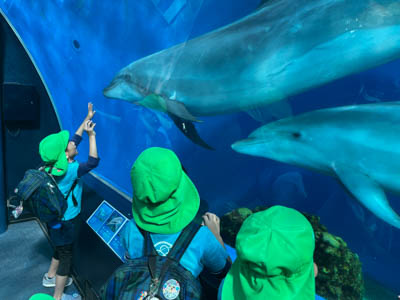
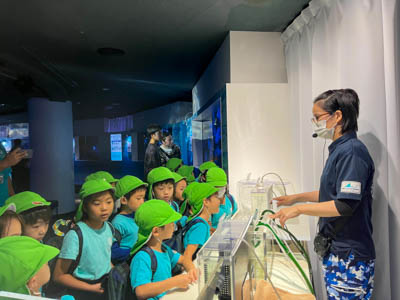
The final research project took place at the zoo (Yokohama Zoo, Zoorasia). The children were able to look around with a different perspective than they usually have when they visit the zoo with family and friends.
"I think they have hard claws on their legs because they live where the rocks are so craggy."
"Leopards are small and light, so they run fast, don't they?"
In this way, we saw many children making 'guesses' like hakase, rather than simply commenting on how 'fun', 'cute' or 'amazing’ the animals were.
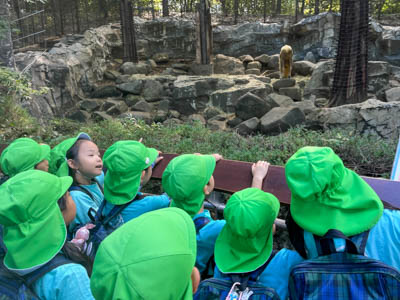
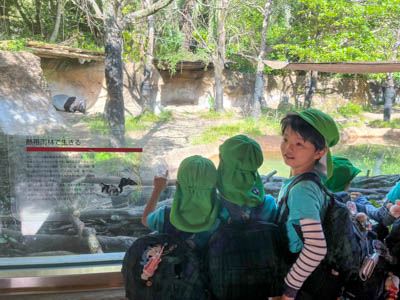
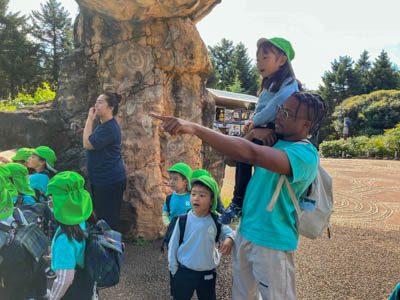
At last, everyone in the Sky class is a Professor of Knowledge!
The unit of enquiry (UOI) 'How the World Works' is now coming to a close. Through this unit, I feel that the Sky class children have naturally developed an attitude of 'questioning' and 'critical thinking' rather than 'just accepting things'.
Here, the Sky class took on a new challenge. They had to think about the answers to their 'why' questions with their families. Normally, CGK does not assign homework to children. Children learn a lot through everyday life, through play and through loving contact with their families. We do not normally give homework because we want the children to spend as much time as possible enjoying this wonderful time.
This time, however, we decided to give the children homework after explaining it to the families beforehand.
<Purpose of giving homework>
- Children have difficulty reading books and illustrated books on their own, even if they want to solve 'why' questions on their own.
- It is not possible for each child to have time to carefully use the internet or other media in class activities.
- Emphasis should be placed on the concept that it is not important whether the answer found is right or wrong, but the process of how the question was solved.
- The questions and ideas that the children came up with on their own were so wonderful that we wanted their families to feel it too.
- Before going on to primary school, we also thought it was a good opportunity for the children to feel what it is like to do homework for school.
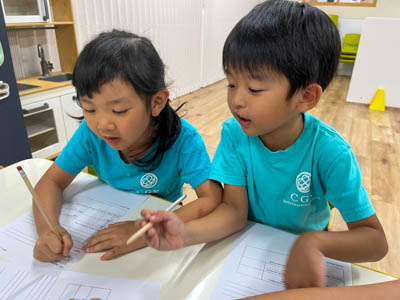
After the Sky class students had finished their homework...
"My mum and I went to the library to look it up!"
"I did a lot of research on the internet."
"I went to the farm on my day off to see the horses!"
I was impressed by the way each one of them confidently told us how they solved their questions before they told us the answers to the 'why' questions.
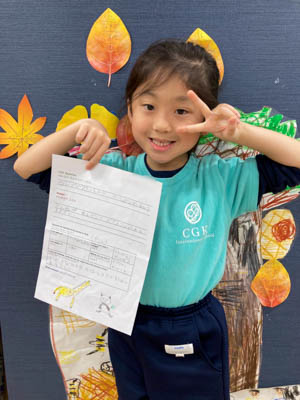
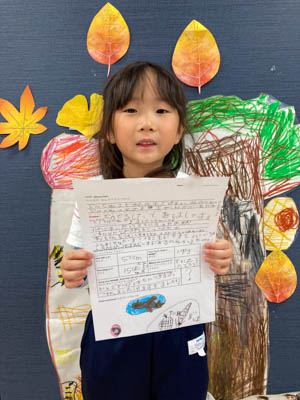
Seeing this, I was delighted to realize that the children were developing the 'problem-solving' skills that the Sky class teachers wanted them to learn through this unit of enquiry (UOI).
Of course, the answers to the homework assignments that the students came up with were just as good as answers from adults!
Finally, the Sky class children created posters of what each of them had researched.
They drew their own original posters full of individuality, with the answers to the 'why' questions and the details in text and drawings.
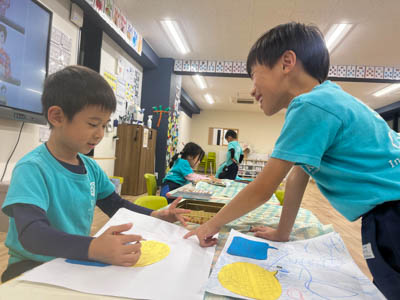
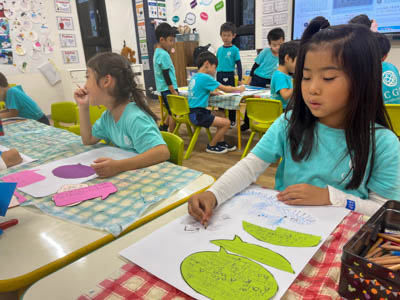
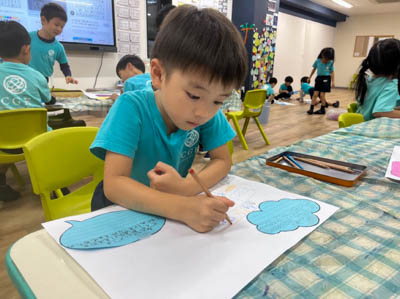
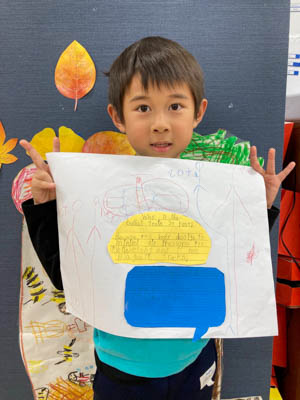
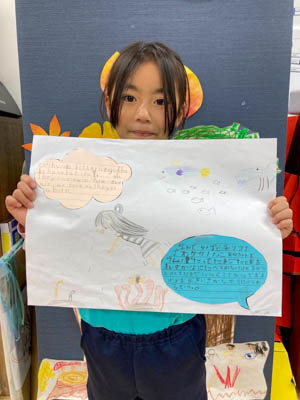
Above all, everyone's willingness to solve 'why' led to many flowers blooming on “Sky-san's Hakase Tree”, which was lonely at first with only a tree trunk! When the children saw this colourful “Hakase tree”, they had confidence on their faces, and they were full of a sense of achievement.
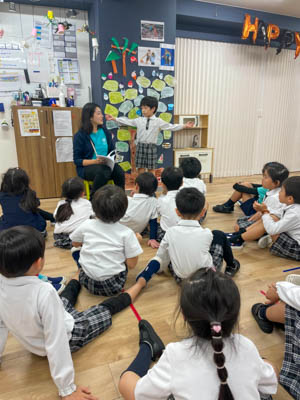
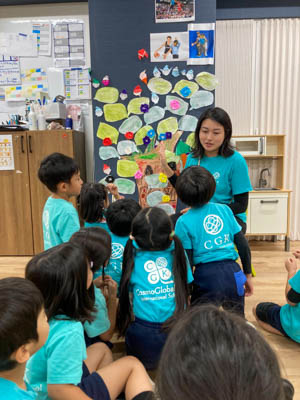
The children were initially convinced that teachers and adults knew everything already. However, through this unit of inquiry (UOI), the children learned through their teachers and their families that 'questions arise even as adults'. Instead of just passively waiting, they can acquire knowledge and learn more about the world by investigating what they are interested in.
Now that the Sky students have successfully become "Hakase”, they have just gotten started, and just as the “Sky's Hakase Tree” had many leaves and flowers that gradually bloomed and changed color, we hope that each and every one of the Sky children’s interests and questions will continue to grow and expand.
In the next unit of inquiry (UOI): “How We Express Ourselves”, we will continue to work with the children to develop our own ideas for activities. What will be next for these Hakase? Stay tuned for the next article!
Author Profile
-

-
Maya - Preschool Teacher (Japan)

Preschool homeroom teacher for 5-year-old class at CGK International School.
Major in Asian Studies at American University in Japan. 3 years experience at an international preschool in Yokohama (experienced homeroom teacher for 2-5 year olds, and head teacher duties).




















